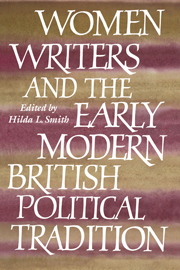Book contents
- Frontmatter
- Contents
- List of contributors
- Preface
- Introduction: Women, intellect, and politics: their intersection in seventeenth-century England
- Part I Women's political writings, 1400–1690
- Part II Women's political and philosophical writings, 1690–1800
- Part III The intellectual context and economic setting for early modern women
- Part IV Early modern legal and political prescriptions for women
- Conclusion: women's writing, women's standing: theory and politics in the early modern period
- Index
Conclusion: women's writing, women's standing: theory and politics in the early modern period
Published online by Cambridge University Press: 04 August 2010
- Frontmatter
- Contents
- List of contributors
- Preface
- Introduction: Women, intellect, and politics: their intersection in seventeenth-century England
- Part I Women's political writings, 1400–1690
- Part II Women's political and philosophical writings, 1690–1800
- Part III The intellectual context and economic setting for early modern women
- Part IV Early modern legal and political prescriptions for women
- Conclusion: women's writing, women's standing: theory and politics in the early modern period
- Index
Summary
A colleague in political science asked me recently whether women were involved in political activity before they were enfranchised. The question illustrates the importance of this volume, and the need to continue to harp on the same questions (to recall Mary Wollstonecraft's words in 1796) about women and politics, past or present.
Political scientists remain remarkably uninterested in women's contributions to the development of the institutions of the modern state, and the means through which men have managed to monopolize political life for so long. Political theorists pay little attention to women's part in the development of the ideas that helped shape those institutions. Even the womanhood suffrage movement, the very different histories of the enfranchisement of women and men, and the fact that women organized against votes for themselves, have been largely ignored, despite the central place of the study of elections and electoral participation in political science. One has to turn to the work of historians to learn about the rich tradition and variety of women's political activities, during which they pioneered some now familiar tactics.
Their activities range in Britain, for example, from petitions to Parliament in the 1640s, through all the major campaigns, such as antislavery, the repeal of the Corn Laws and Chartism, to their part in two world wars. Women were active in trade unionism, the peace movement, the struggle for welfare legislation, in political parties, and anti-feminist movements.
- Type
- Chapter
- Information
- Women Writers and the Early Modern British Political Tradition , pp. 363 - 382Publisher: Cambridge University PressPrint publication year: 1998
- 2
- Cited by



